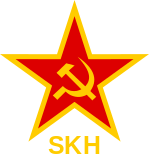Vladimir Bakarić
| Vladimir Bakarić | |
|---|---|
.jpg) Vladimir Bakarić by 1966 | |
| 1st Member of the Presidency of Yugoslavia for SR Croatia | |
|
In office 15 May 1974 – 16 January 1983 | |
| Preceded by |
Jakov Blažević Đuro Kladarin Milan Mišković |
| Succeeded by | Mika Špiljak |
| 3rd Speaker of the Croatian Parliament[a] | |
|
In office December 1953 – December 1963 | |
| Prime Minister |
Jakov Blažević Zvonko Brkić Mika Špiljak |
| Preceded by | Zlatan Sremec |
| Succeeded by | Ivan Krajačić |
| 1st Prime Minister of Croatia | |
|
In office 14 April 1945 – 18 December 1953 | |
| President |
Vladimir Nazor Karlo-Gašpar Mrazović Vicko Krstulović Zlatan Sremec |
| Preceded by |
Pavle Gregorić (as Minister for Croatia) |
| Succeeded by | Jakov Blažević |
| 5th Secretary of the League of Communists of Croatia | |
|
In office 1948 – May 1969 | |
| President |
Vladimir Nazor Karlo-Gašpar Mrazović Vicko Krstulović Zlatan Sremec Himself Ivan Krajačić Jakov Blažević |
| Prime Minister |
Himself Jakov Blažević Zvonko Brkić Mika Špiljak Savka Dabčević-Kučar |
| Preceded by | Andrija Hebrang |
| Succeeded by | Savka Dabčević-Kučar |
| Personal details | |
| Born |
8 March 1912 Velika Gorica, Croatia-Slavonia, Austro-Hungary |
| Died |
16 January 1983 (aged 70) Zagreb, Croatia, Yugoslavia |
| Nationality | Croatian |
| Political party | League of Communists of Yugoslavia (SKJ) |
| ^a The Speaker of the Parliament was the head of state of Croatia between 6 February 1953 and 8 May 1974. | |
Dr. Vladimir Bakarić (pronounced [ʋlǎdimiːr bǎkarit͡ɕ]; 8 March 1912 – 16 January 1983) was a Croatian communist and a politician in Socialist Yugoslavia.
Bakarić helped organize Partisan resistance in Croatia during World War II. From 1948 to 1969 he was the chairman of the Croatian League of Communists, and as such was a close collaborator of President Josip Broz Tito. Even after stepping down from the top post in Croatian communist hierarchy, he retained much influence and was in fact considered to be the most influential Croatian politician.
Together with Edvard Kardelj he belonged to the more liberal wing of the Yugoslav political elite and was known for his statement on the need for "federation to federate" (federiranje federacije), a reference to the struggle between Yugoslav unitarists who advocated giving more powers to the central government and federalists who wanted to shift power to the republics. Still, Bakarić was usually extremely careful in his public pronouncements on policy and wary of radical statements.
See also
References
| Political offices | ||
|---|---|---|
| Preceded by Zlatan Sremec |
Speaker of the Croatian Parliament December 1953 – December 1963 |
Succeeded by Ivan Krajačić |
| Preceded by Pavle Gregorić as Minister for Croatia |
Prime Minister of Croatia 14 April 1945 – December 1953 |
Succeeded by Jakov Blažević |
| Party political offices | ||
| Preceded by Andrija Hebrang |
Secretary of the Central Committee of the League of Communists of Croatia 1948 – 1969 |
Succeeded by Savka Dabčević-Kučar |

